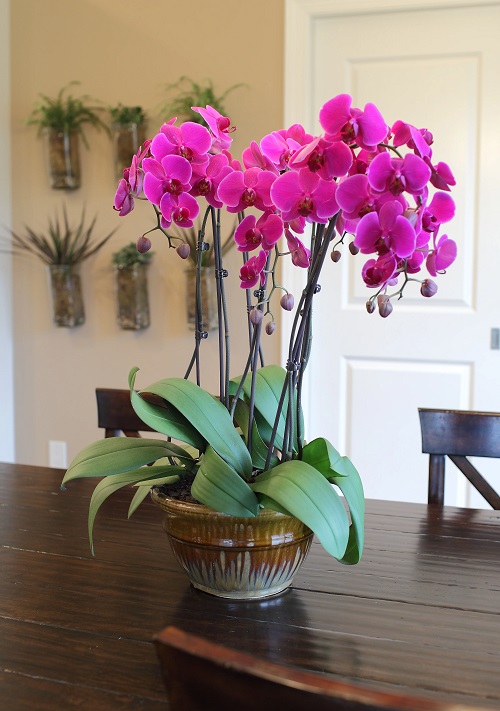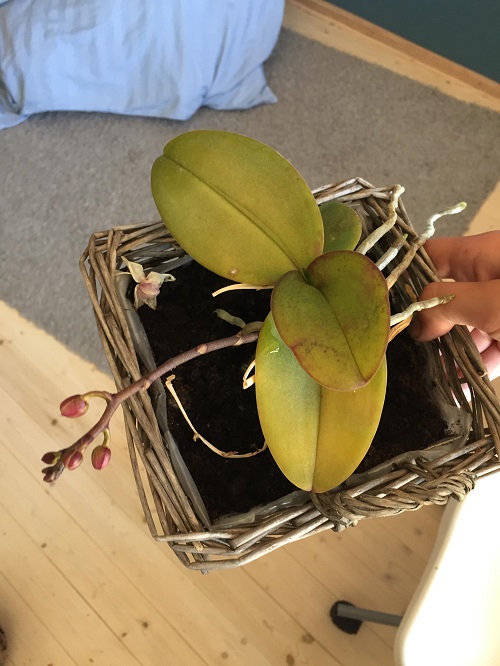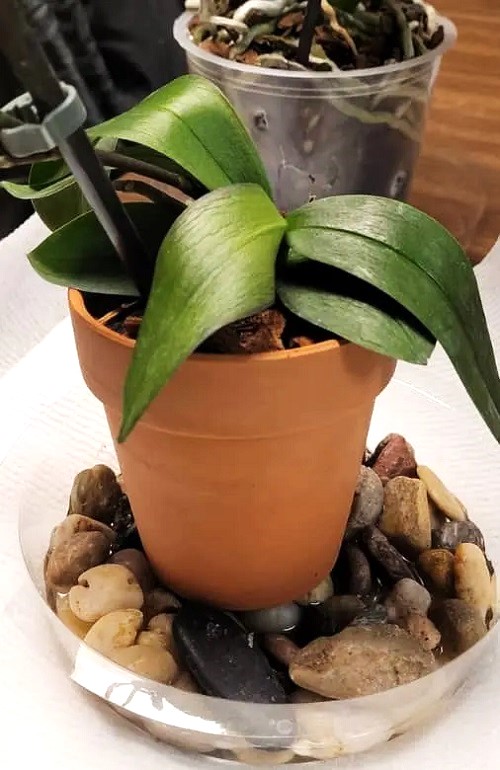Are your Orchid Leaves Falling Off? Don’t worry! We have all the reasons behind it along with their solutions to help you out!
When you notice Orchid Leaves Falling Off, then it can be an indication of many things – so it becomes important to know where to look for problems. This guide will sort things for you!
Find How to Pick the Perfect Orchid Pot here
Orchid Leaves Falling Off
1. Natural Aging Process
As orchids grow and age, it’s completely normal for the older leaves (usually at the bottom of the plant) to yellow and eventually fall off. If the plant continues to produce new leaves, this is likely what’s happening.
Solution: No action is needed. The plant is simply shedding old leaves to make room for new growth.
Find how to Use Lemon Juice for Orchids here
2. Overwatering
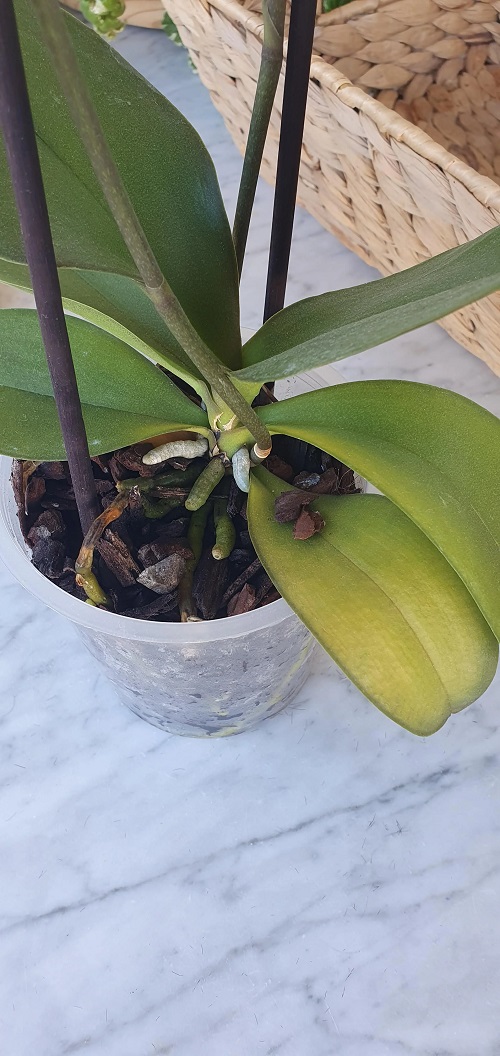
One of the most common causes of problems in orchids is overwatering. Overwatered orchids often have yellow leaves that become soft and mushy and may fall off. Overwatering can also lead to root rot, which can cause leaf drop.
Solution: Water orchids sparingly. Wait until the top inch of the potting medium is dry before watering again. If root rot is present, you may need to repot the plant, removing any rotted roots and using a fresh orchid potting mix.
Here are Signs of Overwatering & How to Save an Overwatered Plant
3. Underwatering
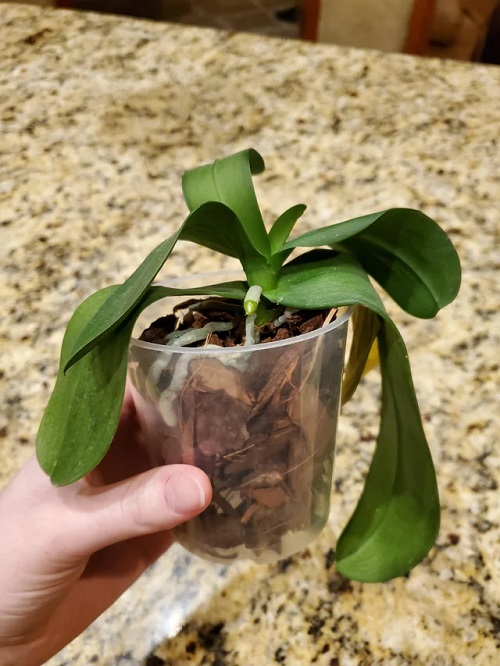
Conversely, underwatering can also cause problems. Underwatered orchids may have wrinkled, wilting leaves that may drop off.
Solution: Ensure your orchid is receiving enough water, but don’t overdo it. The frequency of watering can depend on the type of orchid, its potting medium, and environmental conditions, but generally, it’s a good rule of thumb to water when the top inch of the potting mix is dry.
Look out for these Sure Shot Signs of Underwatered Plants
4. Temperature Stress
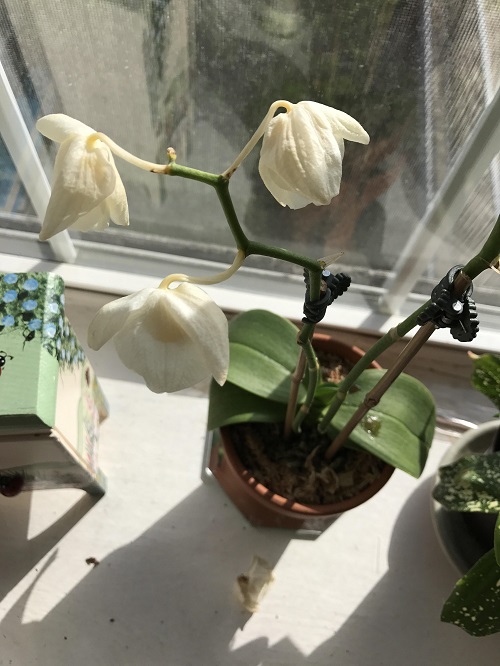
Orchids are tropical plants and most varieties do not tolerate cold temperatures well. Exposure to temperatures below their tolerance level can cause leaves to drop.
Solution: Keep orchids in a location where the temperature stays consistently above 60°F (15°C) but below 85°F (29°C).
5. Poor Lighting
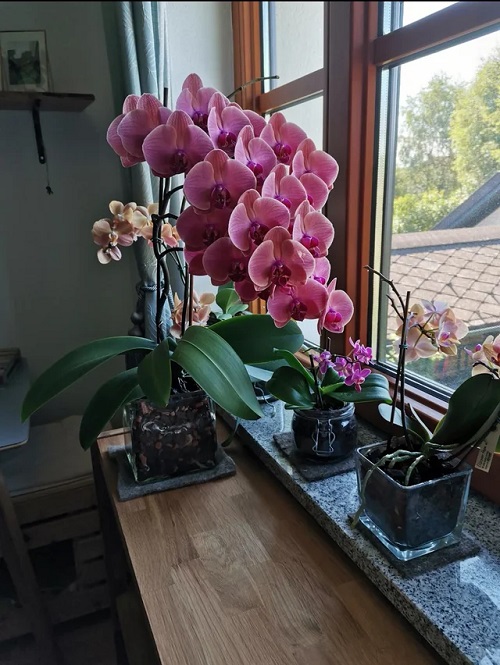
Orchids need good light to thrive, but too much direct sunlight can cause sunburn, which may result in leaf drop. On the other hand, insufficient light can also lead to problems including dropping leaves.
Solution: Most orchids do well in bright, indirect light. Protect them from intense midday sun to prevent sunburn.
6. Disease or Pests
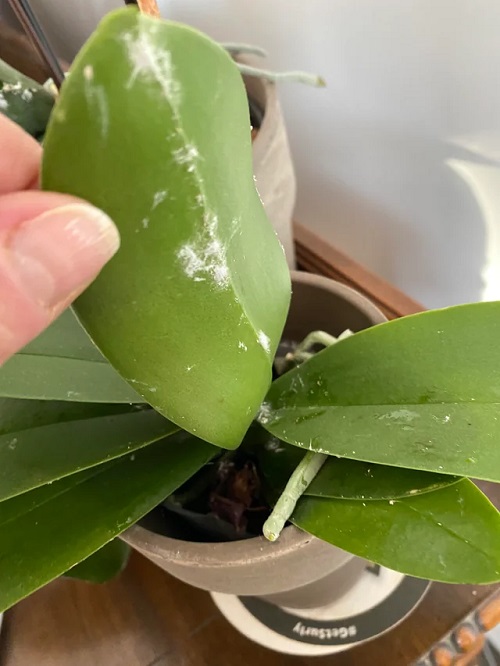
Various diseases and pests can cause leaf drop in orchids. Fungal and bacterial diseases can cause leaf spotting and eventual leaf drop. Pests such as scale, aphids, and mealybugs can also cause damage leading to leaf drop.
Solution: Keep an eye out for signs of pests and diseases. If you see anything concerning, isolate the plant from any others and treat it appropriately. This might involve trimming away diseased parts, treating with a suitable pesticide, or applying a fungicide.
Here are the Best Organic Pest Control Approaches Every Gardener Should Know
7. Transplant Shock
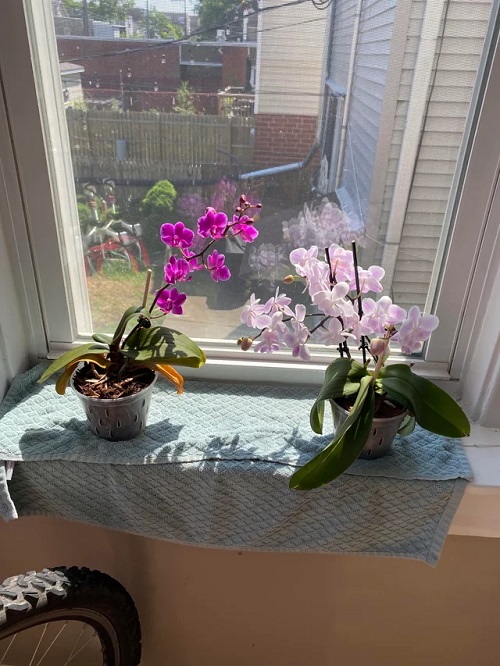
If the leaves of your orchid start to fall off shortly after repotting, it could be suffering from transplant shock.
Solution: Be gentle when repotting and avoid damaging the roots. Also, ensure the new potting medium is suitable for orchids (it should be well-draining), and the new pot is not too large for the plant.
Here is How to Reduce Transplant Shock
8. Nutrient Deficiency
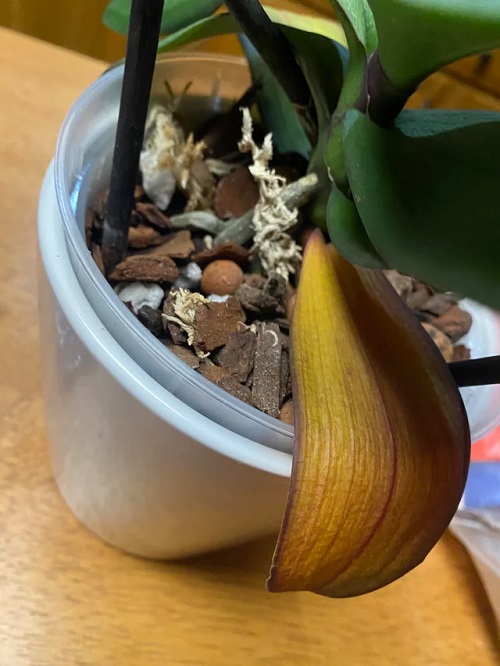
If your orchid’s leaves are falling and you’ve ruled out other causes, it may be lacking certain nutrients, like nitrogen, phosphorous, or potassium.
Solution: Orchids should be fertilized during their active growth phase, which is typically in the spring and summer months. Dilute the feed to 1/4 of its strength and use it once in 4-5 weeks.
Learn How to Get Orchids to Rebloom Here
9. Too Much Sunlight
When orchids receive too much direct sunlight, especially the harsh midday sun, their leaves can get sunburned. Initially, sunburn might show as yellow or red discoloration.
If the exposure continues, the affected areas can turn white and then a dark, dry brown, a sign that the leaf tissue has died. If enough of the leaf dies, the orchid might drop the leaf entirely.
Solution: If your orchid is in a spot where it’s receiving direct sunlight, especially during the hottest part of the day, consider moving it. Eastern or western windows are often a good choice, or a southern window with some kind of shading. If moving the plant is not possible or practical, consider providing some shade to protect it from the most intense sun. This could be as simple as a sheer curtain over a window, or an umbrella or shade cloth for outdoor plants.
Here are the Best Ornamental Grasses For Shade
10. Root Rot
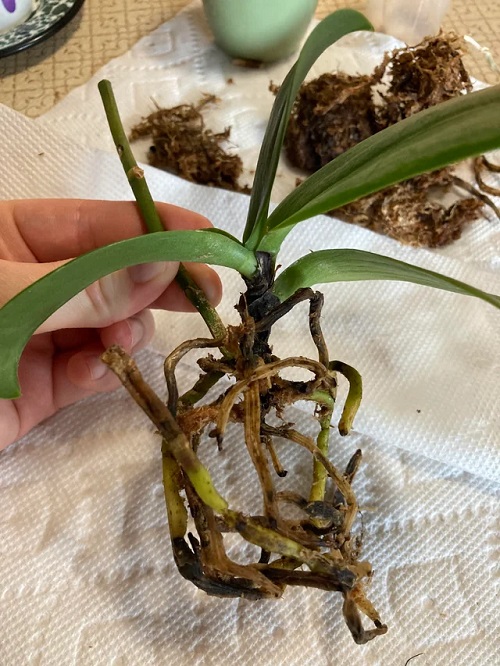
The roots of orchids need access to air and, if they’re constantly wet, they can start to rot. When the roots rot, they can no longer effectively take up water and nutrients to support the plant’s growth.
This often leads to a general decline in the plant’s health, including yellowing leaves, wilting, and leaf drop. In severe cases, the plant may die.
Check Flowers that Look Like Orchids here
Solution:
- If you suspect root rot, remove the orchid from its pot and inspect the roots. Healthy orchid roots should be firm and a light green color when wet. Rotted roots will be brown or black and may feel mushy.
- Use a sterile tool to cut away any rotted roots. Be sure to remove all affected roots to prevent the rot from spreading.
- After removing the rotted roots, repot the orchid in a clean pot with fresh, well-draining orchid potting mix. Orchids typically prefer a potting medium like bark or sphagnum moss that allows air to reach the roots.
- After repotting, water the plant thoroughly and then let it dry out completely before watering again. Orchids generally prefer to dry out between waterings.
Here is How to Treat Root Rot in Houseplants Like a Pro
11. Incorrect Humidity
Low humidity can cause dehydration, resulting in wrinkled or shriveled leaves that might eventually fall off. It can also make the plant more vulnerable to pests like spider mites, which can cause further damage.
Here are 10 Ways To Increase Humidity For Houseplants That Work
On the other hand, excessively high humidity, especially without good air movement, can create conditions that favor fungal and bacterial diseases, which can also lead to leaf drop.
Solution: If the air is too dry, you can increase humidity around your orchid. This could be as simple as placing a tray of water near the plant, misting the plant regularly with water, or using a humidifier. Another option is to create a humidity tray: fill a tray with pebbles, then add water until it’s just below the top of the pebbles. Place the orchid pot on top of the pebbles, making sure it’s not sitting in the water.

